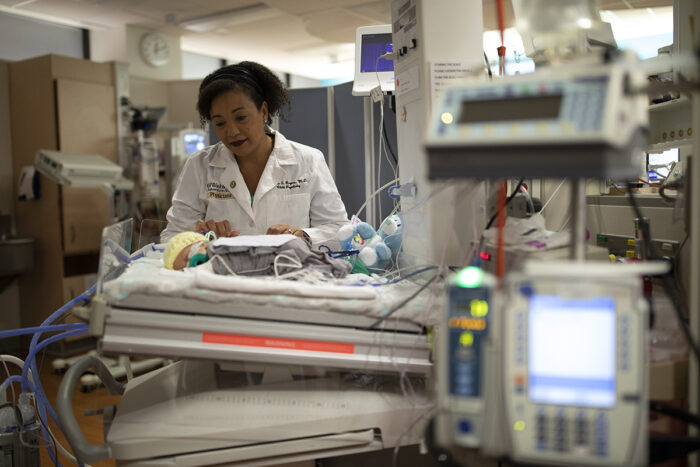Rogers, Smyser awarded MERIT grant for research on preterm babies
Grant totaling more than $7 million could be extended in 5 years
 Matt Miller
Matt MillerCynthia Rogers, MD, visits a premature baby in the Newborn Intensive Care Unit at St. Louis Children's Hospital. Rogers and co-investigator Christopher Smyser, MD, have received a MERIT award from the National Institutes of Health (NIH) to support their research focused on preterm babies’ brains as the children age.
Researchers in child psychiatry and pediatric neurology at Washington University School of Medicine in St. Louis have been named recipients of a prestigious MERIT award from the National Institute of Mental Health of the National Institutes of Health (NIH) to support their research focused on preterm babies’ brains as the children age.
The MERIT (Method to Extend Research in Time) program provides productive investigators leading superior projects long-term, stable funding to foster research creativity and lessen the administrative burdens associated with preparing and submitting regular research grant applications.
The study’s principal investigators are Cynthia E. Rogers, MD, director of the William Greenleaf Eliot Division of Child Psychiatry; and Christopher D. Smyser, MD, a professor of neurology, of pediatrics and of radiology. The MERIT award provides five years of funding support — $7 million for this project. The grant then can be renewed to support the project for another five years, without having to go through the peer-review process again. NIH program staff nominate outstanding investigators for the award.
“The study is designed to improve our understanding of differences in brain structure and function that underlie elevated rates of social impairment that we see in children born very prematurely,” said Rogers, who also is psychiatrist-in-chief at St. Louis Children’s Hospital, and the Blanch F. Ittleson Professor of Psychiatry and Pediatrics.
Children who are born very early — at less than 32 weeks of gestation — are at increased risk for depression, anxiety, learning disabilities, ADHD and other issues. Such disorders can contribute to social problems and victimization by peers as children age.
“We’re coupling state-of-the-art brain-imaging techniques with detailed developmental and psychiatric assessments as we follow this cohort of children from birth, evaluating them during their initial hospitalization in the neonatal intensive care unit and then at ages 2 and 5, 9 to 10, and now at age 14 to 15 to learn how the children progress and to see what types of social challenges some may develop that could be connected to their very early birth,” said Smyser, who also is a professor of radiology.
Smyser and Rogers believe conducting regular evaluations and multiple brain scans as the children grow and develop may reveal key predictors of difficulties that can become apparent as babies grow into toddlers, school-age children and teens.
“The overarching goal is to develop new approaches for earlier and more accurate identification of children who are at risk for social impairments,” Rogers said. “Our hope is to find ways to develop interventions that improve outcomes for these children by limiting the risks for various psychosocial pathologies associated with prematurity.”






